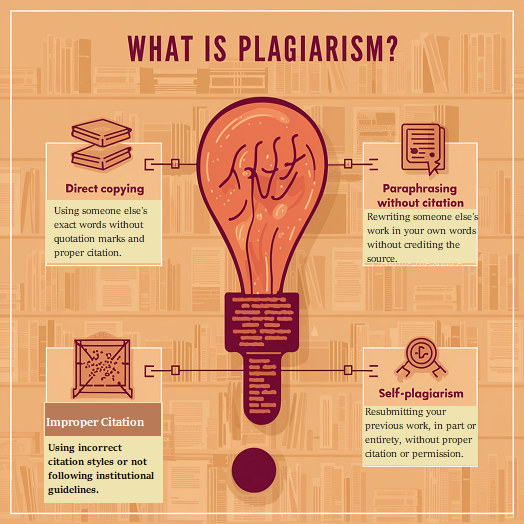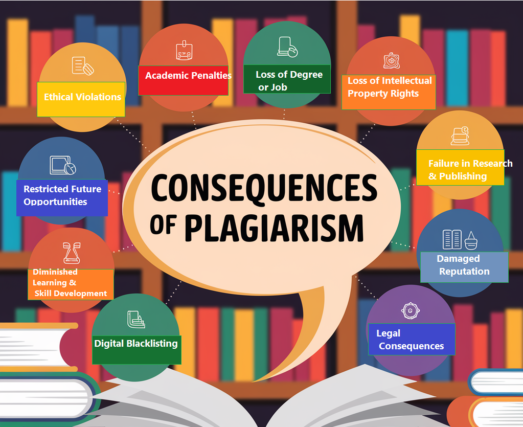Plagiarism is a serious academic offence that can lead to severe consequences, including loss of credibility, failing grades, or even expulsion. Writing original essays requires a solid understanding of plagiarism, what are the consequences of plagiarism, its types, and effective ways to avoid it,. This guide will provide essential strategies to ensure your work remains authentic and plagiarism-free while helping you develop strong academic writing skills.
What is Plagiarism?
Plagiarism is using someone else’s ideas, words, or work without proper acknowledgment. It can be intentional or unintentional and is considered a violation of academic integrity policies in universities worldwide.
Plagiarism can take many forms, including directly copying text, improperly paraphrasing, or failing to cite sources. Even if unintentional, it can still have serious consequences, so understanding plagiarism is crucial for academic success.
Read More on Ielts Essay writing
Types of Plagiarism
Understanding different types of plagiarism can help you recognise and avoid them:
- Direct Plagiarism: Copying text word-for-word without citation, often the most severe form.
- Self-Plagiarism: Reusing your previous work without permission or citation, common in academic settings.
- Patchwork Plagiarism: Copying phrases from multiple sources and stitching them together to form new content.
- Accidental Plagiarism: Failing to cite a source properly due to negligence or misunderstanding is still considered an offence.
- Paraphrasing Plagiarism: Rewording someone else’s work without proper citation, making it appear as your own.
Read More on How to Write a Perfect Academic Essay
Why Should it be avoided?
Plagiarism has serious consequences, including:
- Academic Penalties: Universities enforce strict policies, which may result in failing grades, suspension, or expulsion.
- Loss of Credibility: Plagiarism damages your reputation as a student and professional, affecting future opportunities.
- Legal Consequences: Some instances of plagiarism can lead to copyright infringement lawsuits, especially in professional writing and publishing.
- Hindered Learning: Writing original content enhances your research, critical thinking, and writing skills, which are crucial for academic growth.
Importance of Writing Original Essays
Writing original essays is more than avoiding plagiarism; it nurtures critical thinking, creativity, and independent thought. Students develop a deeper understanding of subjects by researching, crafting their arguments, and contributing to academic discussions. Original essays showcase analytical skills, problem-solving abilities, and the application of knowledge.
Effective Strategies to Write Original Essays
1. Understand Proper Citation Rules
Familiarize yourself with citation styles such as APA, MLA, Chicago, or Harvard. Each academic discipline often follows a specific citation format. Use citation management tools like:
- Zotero (user-friendly, great for managing sources)
- Mendeley (ideal for collaboration and referencing)
- EndNote (powerful for extensive academic research)
These tools help organise references and ensure proper citation formatting, reducing the risk of plagiarism.
2. Develop Strong Research Skills
Conduct thorough research using credible academic sources such as:
- Google Scholar (access to academic papers and journals)
- JSTOR (database for scholarly articles)
- University Libraries (trusted sources for high-quality research materials)
- PubMed (for medical and scientific research)
Detailed notes can help you organize your thoughts and avoid copying content directly. Always differentiate between direct quotes, paraphrased information, and personal insights in your notes.
3. Learn to Paraphrase Effectively
Paraphrasing involves rewriting information in your own words while preserving the original meaning. Follow these steps for effective paraphrasing:
- Read the original text carefully and understand its meaning.
- Write it in your own words without looking at the source.
- Compare your version with the original to ensure accuracy.
- Cite the source to give credit.
Example:
- Original Text: “Plagiarism is a serious offense that can damage a student’s academic career.”
- Paraphrased Version: “Engaging in plagiarism can have severe consequences, potentially harming a student’s academic standing.”
4. Use Plagiarism Detection Tools
Before submitting your work, run it through plagiarism checkers like:
- Turnitin (widely used by universities, provides similarity reports)
- Grammarly Plagiarism Checker (integrates with grammar and writing suggestions)
- Quetext or Copyscape (useful for detecting copied content from online sources)
These tools help detect unintentional plagiarism and highlight areas that need revision.
5. Structure Your Essays Thoughtfully
A well-organized essay minimizes the temptation to copy from sources. Follow this format:
- Introduction: Introduce the topic with background information and a clear thesis statement.
- Body Paragraphs: Present arguments, analysis, and supporting evidence with proper citations.
- Conclusion: Summarize key points and restate the thesis, reinforcing the originality of your work.
6. Give Yourself Time to Revise
Last-minute writing increases the risk of accidental plagiarism. Allocate time to:
- Review and edit your work carefully.
- Cross-check sources and citations for accuracy.
- Use tools like Hemingway Editor or Grammarly for readability and grammatical improvements.
7. Promote a Culture of Academic Integrity
Promote originality by discussing plagiarism policies with professors and peers. Utilize resources like:
- University Writing Centers (offer guidance on academic writing ethics)
- Online Writing Labs (OWLs) (e.g., Purdue OWL for citation help)
- Plagiarism Awareness Workshops (often available in universities)
What Constitutes Plagiarism?

Plagiarism is using someone else’s work, ideas, or intellectual property without proper acknowledgment or permission and presenting it as your own. It is a serious academic and ethical offence beyond simply copying and pasting text without citation. Here are common forms of plagiarism:
- Copying and Pasting: Using someone else’s exact words without quotation marks and proper citation.
- Paraphrasing without Proper Citation: Rewriting someone else’s work in your own words without crediting the source.
- Incomplete Citation: Providing a citation but not enough details for readers to locate the source.
- Fabrication: Inventing or falsifying information and attributing it to a source.
- Self-Plagiarism: Resubmitting your previous work, in part or entirety, without proper citation or permission.
- Uncredited Collaborative Work: Submitting a collaborative project without acknowledging contributions.
- Improper Citation: Using incorrect citation styles or not following institutional guidelines.
- Using Multimedia Without Permission: Copying images, videos, or online content without authorization or credit.
Universities like Harvard and Stanford explicitly define these acts as violations of academic integrity, often leading to severe academic penalties (Harvard College Writing Program, 2023). Institutions widely use tools like Turnitin and Grammarly to detect plagiarism and ensure originality.
What Are the Consequences of Plagiarism?
The consequences of plagiarism can severely impact a student’s academic and professional life. Educational institutions enforce strict policies, which can result in:
- Failing grades for assignments or entire courses.
- Academic probation or suspension.
- Expulsion from the institution in extreme cases.
- Tarnished academic and professional reputation, making it difficult to secure future opportunities.

Real-World Cases of Plagiarism Consequences
To highlight the seriousness of plagiarism, consider these real cases:
- Jayson Blair (The New York Times): Caught fabricating stories and copying content, leading to his resignation and tarnished reputation.
- Melania Trump (2016 Speech): Accused of copying Michelle Obama’s speech, sparking public controversy.
- Harvard Students (2012 Scandal): Over 125 students were investigated for collaborative plagiarism, resulting in academic suspensions.
- Famous Authors & Researchers: Several high-profile researchers and authors have faced reputation-damaging allegations due to improper citation or uncredited work.
Final Thoughts
Avoiding plagiarism is crucial to writing original essays and upholding academic integrity. By following the tips and strategies outlined in this article, such as cultivating a mindset of originality, conducting thorough research, using proper citation techniques, and engaging in self-editing and proofreading, you can ensure that your work is authentic and properly attributed.
Writing with originality showcases your unique voice and perspective and demonstrates your commitment to ethical writing practices. By embracing these tips, you will produce high-quality, original essays and contribute to your field’s intellectual growth and advancement. Remember, writing with integrity is a lifelong skill that will benefit you in your academic journey and beyond.









 Evan John
Evan John
